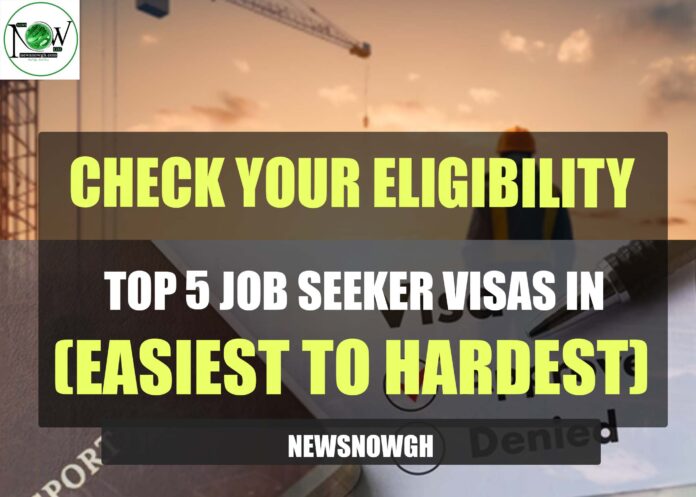Top 5 Job Seeker Visas in 2025 (Easiest to Hardest) – Check Your Eligibility
Have you ever imagined yourself slipping into Swedish culture, climbing the corporate ladder in Dubai, or enjoying an espresso in Lisbon? Guess what, though? It could be simpler than you imagine! Job seeker visas are similar to golden tickets in that they allow you to enter a foreign country specifically for the goal of landing your ideal job.
However, not every visa is made equal. While some nations throw open their arms to visitors, others make you leap through barriers. Let’s take a quick look at the most common (and uncommon) work-seeker visas to obtain:
1. Portugal Job Seeker VISA: Easiest
- Portugal is similar to that laid-back, stylish friend who’s always game for a trip. You’re almost in if you can speak a little Portuguese and have some money in the bank!
- What you’ll need: A current passport, evidence of housing, a sufficient amount of cash, no criminal record, and health insurance. Oh, and the application price is around €90.
- If you play your cards well, you can stay for up to 180 days.
https://vistos.mne.gov.pt/en/national-visas/necessary-documentation/job-seeker-visa
2. United Arab Emirates (UAE) Job Seeker VISA: Moderately Easy
- Imagine future technology, sparkling skyscrapers, and a booming labor market. However, the UAE is searching for the best candidates, including recent graduates from prestigious universities and extremely talented professionals.
- What you need: A bachelor’s degree, evidence that you are not impoverished, and either a degree from a prestigious university or placement into one of the talent groups. Although it costs AED 310, you might soon be living the good life!
- You have the option to stay for 60, 90, or 120 days—it’s like having a flexible visa!
https://u.ae/en/information-and-services/visa-and-emirates-id/visit-visas/jobseeker-visit-visa
3. Sweden Job Seeker VISA: Slightly Difficult
- Imagine this: beautiful scenery, quaint cafes, and a culture that respects work-life harmony. It sounds good, doesn’t it? However, Sweden needs proof that you’re committed to boosting their economy.
- What you’ll need: A strong plan for finding employment or launching a business, insurance, a robust financial account, and an advanced degree. You will need to pay SEK 1,000, but just think of those fika breaks!
- You have six months to leave your mark if you stay.
4. Austria Job Seeker VISA: Moderately Difficult
- Austria might be calling your name if you enjoy mountains, classical music, and showing that you are the finest. However, visas aren’t being given out like free schnitzel. They have a point system that rewards professionals with advanced training in particular domains.
- What you need: Proof of cash, health insurance, and enough points to impress (70 or more, depending on your age, work experience, education, and language proficiency). That mountain air will make the €150 charge worthwhile!
- You have six months to stay to make your way into employment.
5. Germany Job Seeker (Non-academic) VISA: Most Difficult
- Although Germany is a leader in business and innovation, they are also the hardest to obtain a work visa for. They are looking for exceptional talent who can start right away and speak the language.
- What you’ll need: A degree in German or a related field, five or more years of experience, fluency in the language, and enough cash to get by. The cost of the application is €75, but consider the pretzels you could purchase!
- You have six months to fulfill your aspirations while you are here.
https://digital.diplo.de/navigator/fr/visa/overview/job-seeker-beruf
Conclusion
Obtaining a job seeker visa is essential for accessing global professional prospects, but it’s not an easy feat. Do your homework, comprehend the standards of the countries you are targeting, and masterfully construct your application. You never know, maybe your ideal career is waiting for you across the globe!
Follow us on Newsnowgh.com to stay updated on the latest information regarding work permits, visa application processes, paths to permanent residency, and visa-sponsored employment.


